This is topic Thomas Edison in forum General Yak at 8mm Forum.
To visit this topic, use this URL:
https://8mmforum.film-tech.com/cgi-bin/ubb/ultimatebb.cgi?ubb=get_topic;f=8;t=000587
Posted by Paul Adsett (Member # 25) on May 10, 2007, 03:30 PM:
It is widely assumed here in the USA that Thomas Edison invented the cinema projector. Reading Edison's latest biography ' The Wizard of Menlo Park' (now available at Barnes and Noble, and a terrific read) the author states that Edison had no interest at all in projected cinema. In fact the opposite is true, he thought more money could be made with the Kinetescope parlours, where patrons paid a 5 cent fee to look at short 1 minute films on an individual hand cranked viewer.
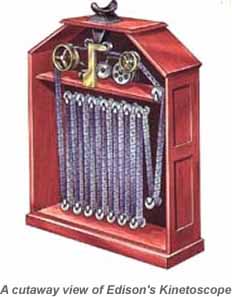
Edison actually went out of his way to discourage development of the cinema projector, and it was left to others (Latham and Armot in the USA, and Lumiere in France) to make the breakthrough of large screen projection to mass audiences. In the USA, Armot perfected the intermittent mechanism and Latham invented 'the Latham loop' which was the (now familiar) isolation of the feed and take-up spool loads by the use of sprockets. They could not get any funding to market their projection invention because no one would finance it unless it had Edison's name on it. So Edison agreed to supply his name, and ended up getting all the credit for the cinematograph that he did not invent.
[ May 11, 2007, 02:11 PM: Message edited by: Paul Adsett ]
Posted by Osi Osgood (Member # 424) on May 10, 2007, 05:16 PM:
That's the sad truth of history. Edison recieved credit for many in invention that he didn't actually invent. That's not saying that Edison didn't do his fair share of inventing. His
greatest strength was in marketing. While other inventors were good at inventing, they weren't good at patenting thier ideas.
Disney is another example of this.
First sound cartoon ... Disney?
No, it was Max Fleischer, who invented "Phonofilms" which also had the first synchronized soundtracks, in 1924, a full 4 years before Disney, (there is still at least one of these phonofilms still in existence today)
First color cartoon ... Disney?
No, it was Walter lantz, who released the first color cartoon as a segment of the feature, "The king of Jazz' released in the then two color process. Also Ub Iwerks, in the same year, released the first of the "Flip the Frog" cartoons in two strip color, (which is available from Blackhawk films, but is hard to find these days.)
First use of a rotoscope camera (for depth in animation)
Disney? No ... Maz Fleischer. His rotoscoping work in the Popeye cartoons AND other releases predate Disney by 2 or more years.
Yet, in all these instances, Disney got credit for these advancements in animation. Why?, because he knew how to market these ideas. Max Fleischer, for all his inventiveness, did not know how to market what he had. Disney, thru a number of abuses in the industry early on, bacame a "shark" himself. Yes, he made exceptional films a some technical advances himself, but not to the level that people today give him credit.
Posted by Steve Klare (Member # 12) on May 10, 2007, 09:39 PM:
I studied Edison once, and it seems that his strength is not so much in inventing specific widgets, but coming up with entire systems, thereby making them more practical and marketable.
-Let's face it, having a light bulb is no big deal without a lamp socket, a fuse panel, transmission lines and a power station.
He also systematized research and development; meaning that instead of an inventor tinkering alone in his shed, now a whole bunch were working together under one roof and sharing ideas.
Disney's story is not so much that it's best to be first, but better to be best first. Sure, Steamboat Willie was technically not the first sound cartoon, but it is the one that changed audiencesí expectations of cartoons.
Today we all know that Christopher Columbus wasn't the first European in the new world, however, the fact that the Vikings got here first changed very little!
Posted by Dan Lail (Member # 18) on May 10, 2007, 11:49 PM:
Steve, that was profound! Let me be the first to congratulate you. ![[Big Grin]](biggrin.gif)
Posted by Mike Peckham (Member # 16) on May 11, 2007, 05:20 AM:
I'm always interested in where Friese-Green fits into all of this, his was a tragic story of lost opportunities and possibly for the reason that Osi states; that he was one of those guys who was good at inventing things and not so hot at patenting, marketing and funding his ideas.
Where does he fit into the time line with Edison and Lumiere?
I found this short biography on the web;
quote:
Born in College Street Bristol on 7th September 1855, William Friese-Greene set up his own studios in Bath & Bristol, the grandly named 'Photographic Institute'. It was in Bath that he made the acquaintance of John Arthur Roebuck Rudge, a tall gaunt bearded inventor of magic lanterns. J.A.R. Rudge had devised a latern, the 'Biophantoscope', which could display seven slides in rapid succession, giving the illusion of movement. William found the idea amazing and irrisistible, and started work on his own camera - a camera to record real movement as it occured. His toil was rewarded, when he became the first man to ever witness moving pictures on a screen.
Patent No. 10,131, for a camera with a single lens to record movement was registered on 10th May 1890, but the cost of development drives him into bankruptcy and brings him a short sentence in debtors' prison.
Friese-Greene takes out 78 British patents between 1889 and 1921 but none becomes the basis of an industry. He works on stereoscopic film, stage effects and colour film, develops a process for producing photographic cigarette cards and another eventually becomes the first X-ray examination system in Britain.
Constantly fighting to avoid bankruptcy, Friese-Greene was 66 when he attended a meeting of film moguls in London. Alarmed by the animosity between them, he stood up to speak but became incoherent. Helped back to his seat, he slumped forward and was found to be dead. He had just a shilling and 10 pence in his pocket - the price of a cinema ticket at the time.
On the hour of his funeral, all the cinemas in Britain halted their films and held a two minute silence in belated respect to 'The Father of the Motion Picture'.
Mike
Posted by Osi Osgood (Member # 424) on May 11, 2007, 10:35 AM:
Quite touching. Let us not forget Tesla as well. Scientists are STILL attempting to figure out his inventions. Some believe that the testing of his worldwide form of sending electricity without wires to homes was the cause of the Siberian fireball, (thought by many to also be caused by a meteor) that leveled a large area back in 1908.
Tesla was one of those genius's that intelectually and theorectally was truly miles ahead of his contemporaries.
Posted by Paul Adsett (Member # 25) on May 11, 2007, 01:56 PM:
Hi Mike,
Thanks for posting that biography excerpt. A really great movie biography of British cinema inventor William Friese-greene ( which includes the scene at the film meeting described above)is the 1951 British feature film 'The Magic Box'. This film was a joint production of all the leading British film studios, made especially for the 1951 Festival of Britain.
Here is a review of the Derann Super 8 print:
http://8mmforum.film-tech.com/ubb/ultimatebb.php?ubb=get_topic;f=4;t=000071
Posted by Mike Peckham (Member # 16) on May 13, 2007, 09:47 AM:
Paul
Whilst browsing the September 1969 copy of Movie Maker, I came across a brief, illustrated biography of "Claude Focus" who must surely be the first man to build a Movie Camera;
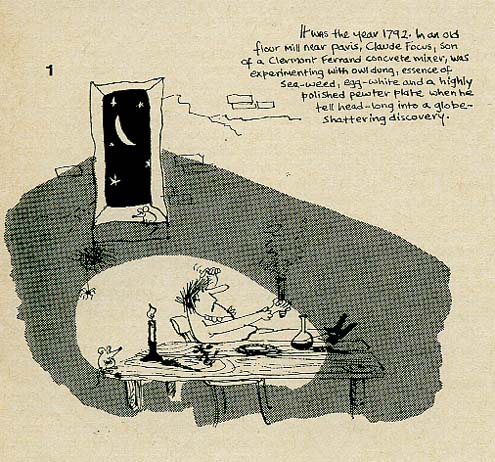
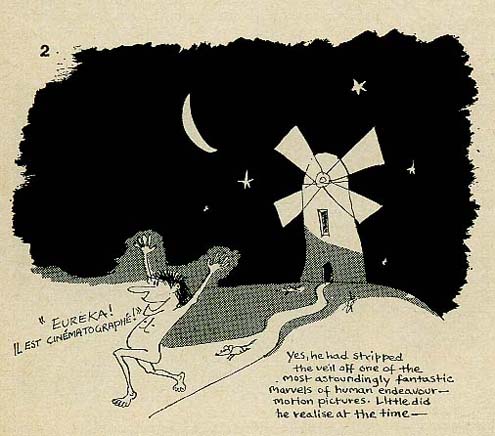
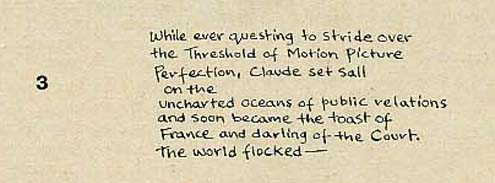
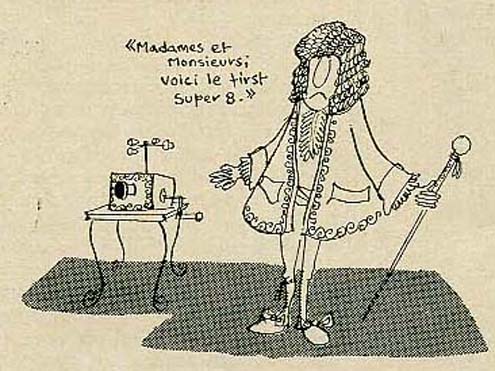
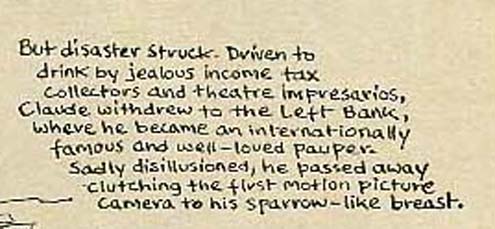
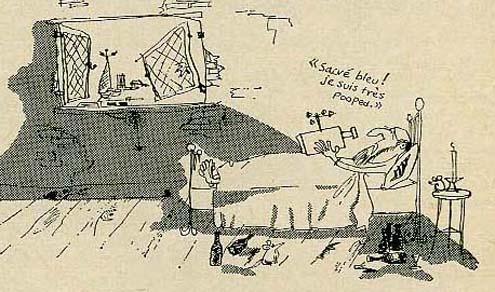
Mike ![[Wink]](wink.gif)
Visit www.film-tech.com for free equipment manual downloads. Copyright 2003-2019 Film-Tech Cinema Systems LLC

UBB.classicTM
6.3.1.2

![[Big Grin]](biggrin.gif)






![[Wink]](wink.gif)